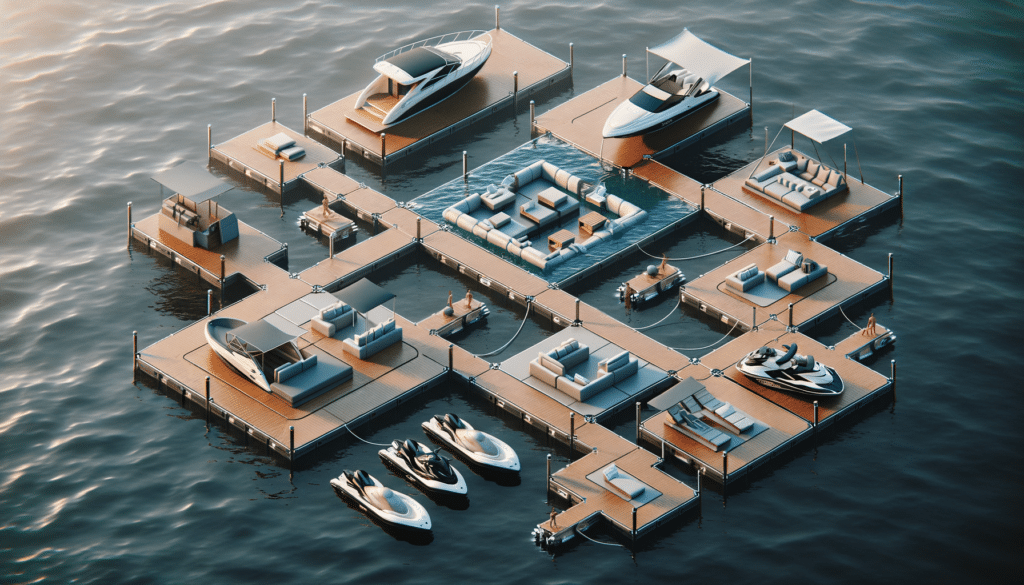Understanding Floating Docks
Floating docks are an innovative solution for those looking to enhance their waterfront properties. Unlike traditional fixed docks, floating docks rise and fall with the water levels, making them ideal for areas with fluctuating tides or water levels. They are constructed using buoyant materials such as plastic, foam, or even concrete, which provide stability and durability. These docks are not only practical but also offer aesthetic appeal, as they can be customized to fit various designs and needs.
One of the primary advantages of floating docks is their adaptability. They can be easily installed in diverse environments, from calm lakes to more turbulent coastal waters. Additionally, their modular nature allows for expansion or reconfiguration, catering to changing needs over time. This flexibility makes floating docks a preferred choice for many homeowners, marina operators, and even commercial establishments.
In terms of maintenance, floating docks require less upkeep compared to their fixed counterparts. Since they are not anchored to the seabed, there is minimal risk of damage from underwater currents or debris. Furthermore, their materials are often resistant to corrosion and UV damage, ensuring longevity. Overall, floating docks offer a blend of convenience, durability, and versatility, making them a valuable addition to any waterfront property.
Exploring Floating Dock Systems
Floating dock systems are comprehensive setups that include various components such as walkways, ramps, and platforms. These systems are designed to provide a seamless and user-friendly experience for boaters and waterfront enthusiasts. The modular design of these systems allows for easy customization and expansion, enabling property owners to tailor the setup to their specific needs.
One of the key benefits of floating dock systems is their ease of installation. Unlike traditional docks, which require extensive groundwork and construction, floating dock systems can be assembled quickly and with minimal disruption to the environment. This is particularly advantageous in ecologically sensitive areas where preserving the natural habitat is a priority.
These systems also offer enhanced safety features. Non-slip surfaces, sturdy handrails, and secure mooring points ensure that users can enjoy their waterfront activities with peace of mind. Additionally, many floating dock systems are designed to withstand harsh weather conditions, providing reliable performance year-round.
In summary, floating dock systems are a practical and efficient solution for those seeking to maximize their waterfront space. Their modular nature, ease of installation, and safety features make them a popular choice for both residential and commercial applications.
Choosing the Right Floating Boat Docks for Your Needs
When selecting a floating boat dock, several factors should be considered to ensure the best fit for your specific situation. The size and type of your watercraft, the water conditions, and your budget all play crucial roles in determining the most suitable dock.
For those with larger boats, a more robust dock with higher buoyancy and stability is essential. This ensures that the dock can support the weight and movement of the vessel without compromising safety. On the other hand, smaller boats or personal watercraft, such as jet skis, may require less substantial docks, offering more flexibility in terms of design and placement.
Water conditions also influence the choice of a floating dock. In areas with strong currents or high waves, a dock with enhanced anchoring systems and durable materials is necessary to withstand the elements. Conversely, in calmer waters, a simpler setup may suffice, allowing for cost savings without sacrificing functionality.
Budget considerations are always important. While initial costs for floating docks can vary, it’s crucial to factor in long-term benefits such as reduced maintenance and increased property value. By evaluating these aspects, property owners can make informed decisions that align with their needs and financial constraints.
Ultimately, choosing the right floating boat dock involves balancing functionality, aesthetics, and cost. By carefully assessing your requirements and exploring available options, you can find a dock that enhances your waterfront experience while providing lasting value.


